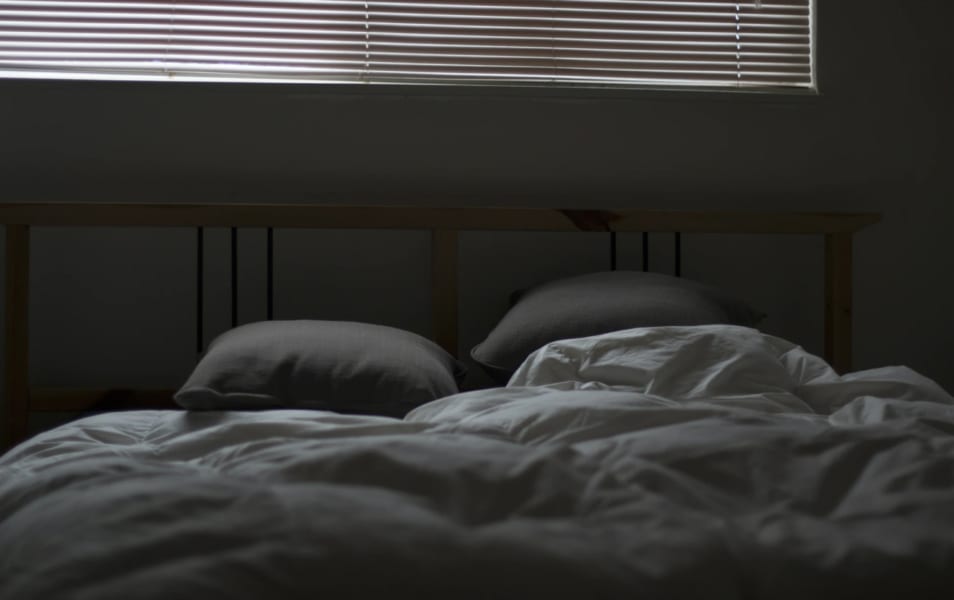It’s time to commit to your sleep.
Becoming a better sleeper and developing better sleep hygiene (a fancy word for healthy sleep practices) is a mix of micro and macrosteps. And now is the perfect time to make your sleep dreams come true. The level of stimulation from each day doesn’t just fade away when you get into bed, so these tips begin way before your head hits the pillow. We don’t just go from fully stimulated to deeply relaxed with the flip of a switch.
According to a recent survey we conducted, a whopping 74% of you felt more stressed out than usual in 2020, and 56% of you said that stress left you feeling sleep-deprived. We’re in a new era of what health and wellness really mean, and being chronically stressed is a serious roadblock to being the better version of yourself that you know is in there. Follow these micro and macro steps to support your resilience to stress and a balanced nervous system, resulting in a well-rested you.
1. Stick to a consistent sleep schedule.
Yes, this includes the weekends. We know this is a macro step, but it’s the most impactful step you could take. This will set your internal clock to expect recovery at a certain time each day. Even if you find yourself not sleeping well one night, stick to your set wake-up time. We know it sounds counterintuitive, but getting up at your set time will let you sleep better the next night.
2. Go screen-free before bed, and stay that way.
Plug your phone in across the room. You can use “Do Not Disturb” to only allow calls from specific people. Screens and sleep just don’t mix — it’s that simple.
3. Use a watch or alarm clock.
This directly supports your new effort to go screen-free. If you don’t have your phone next to you in bed as an alarm, you’ll be a lot less likely to start scrolling aimlessly. Basically, you’re trying to make reaching for your phone that much trickier.
4. Get outside in the morning.
In the winter, the sun rises later in the morning, it’s cold, and it’s often cloudy. Go outside, no matter what. Sunlight produces feel-good serotonin, signals your body to wake up, and produces Vitamin D. Windows filter the light which decreases the benefits to your brain. Even if it’s cloudy, exposing your eyes to natural light energizes you throughout the day and helps you sleep at night.
5. Schedule breaks in your day.
Create a schedule that allows you to hone your focus and get your work done efficiently. These breaks help you recover from stress so you come back to your work fresh. Sunlight and movement boost your serotonin and your mood.
6. Watch the sun go down.
Watching the sun go down triggers the production of melatonin which helps you feel sleepy. It’s winter, so it really is okay to go to bed early, and the extra zzz’s will give your body the rest and recovery it needs to bounce back from stress so you can feel clear and focused the next day. It’s normal to need more sleep in the winter.
7. Establish a little nighttime routine.
Things like showering, putting on lotion, and brushing your teeth can turn into a ritual that helps signal bedtime for your brain. The Relax and Unwind mode on Apollo has a place in our nighttime routine, and makes the whole process even more relaxing. “Repetitive rituals are part of what makes us human and ground ourselves,” says Tricia Hersey, the founder of Nap Ministry. No matter where you are “you can daydream. You can slow down. You can find small ways to stop and remember who you are.”
8. Avoid stimulating news, shows, and media.
Again, we’re looking at you #2, but it extends past your phone. The news cycle is really overwhelming right now. And this rule even applies to conversations that may trigger or excite you.
9. Sleep in a cool and comfy room.
Depending on where you live, this could include heat or air conditioning, but studies show that 65 degrees Fahrenheit is the magic number. Don’t skimp on making your bed a super comfy place to be.
10. Avoid foods that keep you up.
Heavy meals too close to bedtime can be tough on your digestive system. Everyone is different, but stay curious about what foods keep you up — some people are affected by fatty foods, others by acidic. No matter what it is, it’s no fun.
11. Steer clear of caffeine in the afternoon.
It’s time to ditch that afternoon latte. You’ll want to avoid any beverage or food that has caffeine (yes, that means you, chocolate) at least 6-8 hours before bedtime.
12. Just say no to a nightcap.
Alcohol before bed is the fast track to restlessness, and it hurts your overall sleep quality. Those who track HRV understand that even a glass of wine before bed can diminish your HRV significantly.
In a recent article in on the connection between COVID-19 and sleep in The Atlantic, James Hamblin sums it up well:
“On weekends, wake up and go to bed at the same time as you do other days. Take scheduled walks. Get sunlight early in the day. Avoid screens for an hour before bed. Stay connected with other people in meaningful ways, despite being physically distant.”





